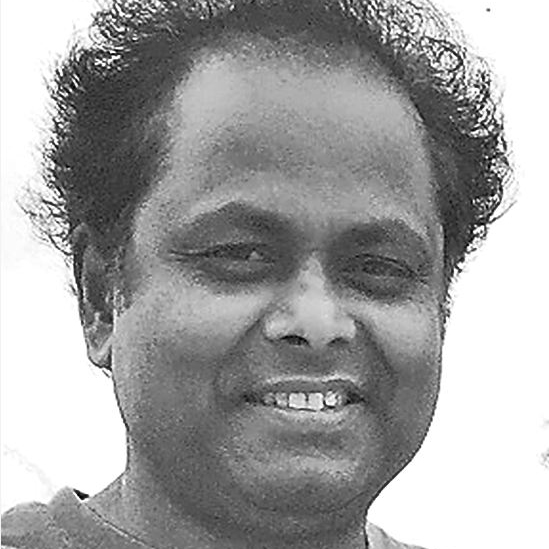Columns
Death and mourning
Mourning is a personal experience since no two persons have the same memories of the deceased.
Pramod Mishra
This has been a year of death and farewells. This has been a season of mourning. A period of counting the rising mortality statistics. The television tells me the latest numbers and Facebook gives me pictures of those that have been lost forever amongst those whom I had known growing up in my village. The social media experience is still virtual, but its effect is nonetheless immediate without the organic surroundings. My response to death announcements on Facebook has become limited to a ‘like’ or a ‘RIP’, or just silence.
These past weeks, two old-age deaths sent me down my memory lane. The first of Surya Narayan, whom we called Jimdar of Sungha, who, unlike many other landholding Rajbanshi men who were known for their exercise of power, was an unassuming vegetarian with the oldest private pond in the area. He had a concrete brick-and-cement building made for the vegetarian sect, Santmat Satsang, whose monks came annually from the banks of the Ganges to preach nirgun (formless) devotion and meditation and ethical injunctions against falsehood, larceny, violence, intoxication and sexual misconduct. These formed my early lessons in dos and don’ts.
He also funded the annual all-night naach shows on festive occasions by drama troupes that came from across the Nepal-India border. When herding our family buffalo in the open expanse of the harvested fields near his village, I had nearly drowned in his pond but was rescued by my fellow herders. The bigger rescue occurred when my mother and I (both lapsed vegetarians) attended those weeklong sermons of monks at the monastery (Satsang Temple) across the road from Surya Narayan’s house. I had an uncle, Sampat Lal Rajbanshi, in the village with whom we stayed on these occasions.
But the most important rescue came from the staging of the epics, The Ramayana and The Mahabharata. Illiteracy reigned and books other than primary textbooks didn’t exist in my childhood. I had to throw tantrums, kick and scream, before my mother allowed me to walk those miles to attend those all-night shows about demons and gods. The annual staging of the epics gave me hope that good eventually triumphs over evil and that there is a world beyond—more magical, more dramatic, more inspiring than my own reality. The death of Jimdar marked the end of an era for eastern Madhes in more ways than one.
While Surya Narayan represented the old order of epics and sermons, Sugan Lal ushered in the modern lifestyle—with romance and luxury—in the area. He was the first to bring a speaking wooden box in the area that we came to know as the radio. Dogs for us were only strays until he brought a poodle that shook hands or saluted when he asked it with a leather-tipped wand. He was the first in the area who had attended college. And, by falling in love himself as a young man, he gave permission that love doesn’t have to come only after marriage. Despite some flaws due to his feudal background, he was a pioneer for us in more ways than one.
I did not know either of the men well, because their villages were miles away from mine. But this week, I also lost a close friend whom I had known since I was eight years old. I had met him first at the village Madrassa where my father sent me to learn Urdu, Arabic and Persian. Nazir drank buffalo milk and I could have only cow milk. He tended his buffalos while I looked after my cows. He was strong in body and I learnt the Arabic alphabet faster. On Muharram, I travelled with him with the Tazia, the paper temple, swinging sticks. In our wrestling bouts, he always pinned me down. When we moved to the Muslim village permanently in my teens, he and I became thick as thieves. As teenagers, we shared stories, hopes and uncertainties. He was my eyes and ears into the private lives of the villagers because I was away for much of the year. Hindu and Muslim societies lived close together even when they were separate in manners, festivals and morals; but I had social relatives in both. For me, social relations were thicker than blood. Yet, no relation could match our friendship—those hours of intimate exchanges of gossip, the perennial themes of teenage talk. I was mostly the listener. He was the hero.
And then I left the village for longer periods, while he continued to stay there, helping his father in farming and grazing. He later married Mejbani Mausi’s daughter and became my brother-in-law. My mother’s sisterhood with Mejbani Mausi (Guest Aunt) made one half of the Muslim village my kinfolk. He later joined the then CPN-UML after I became its supporter and rose to be elected as Ward Chairman. During the 10-year Maoist insurgency, Maoists pushed hard to recruit him, but he never budged and remained devoted to non-violent politics. Some villagers falsely informed the Army against him, and they took him away and kept him at its eastern headquarters. The next time I was back in town, the Army had released him, but kept him on mandatory appearance dates. I met the English-speaking Brigadier General and explained the harassment Nazir had faced from both sides of the political conflict and his name was struck off from the list of suspects.
For years I would have no contact with him. Then, when I visited, the years of non-communication would vanish and we became like before, exchanging stories—both good and bad. My last phone conversation with him three months ago was about the prison sentence of a Musahar man from the village who had earlier eloped with an underage Pahadi girl. And then came the call about his own sudden illness and death of lung infection on the 10th day of Dashain.
I processed the first two deaths intellectually, explaining their social and cultural import, marking epochal transitions in my rural setting. But the death of this friend is personal. No scripture or platitudes about grief, death and mourning can immediately help the involuntary emotions because personal grief is a strange thing. Only time will slowly take away the sting. I have gone through it twice before—when I lost my parents within a decade of each other. I have realised that no material circumstance can steal from the sense of this finality of not having a friend next time I am in the village. And nobody can share this finality either, because one’s memories of the person lost are peculiarly one’s own.




 11.12°C Kathmandu
11.12°C Kathmandu















